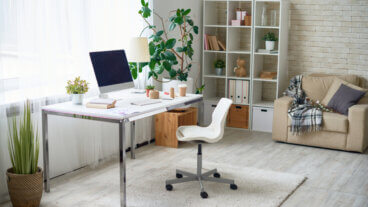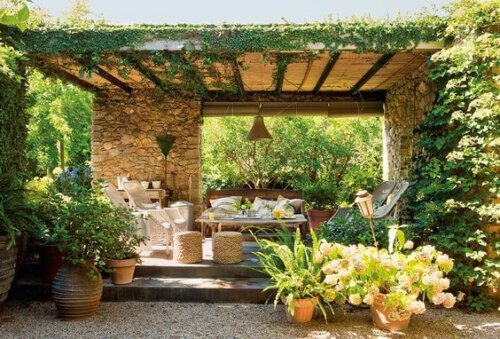Types of Wood for your Bathroom Decor
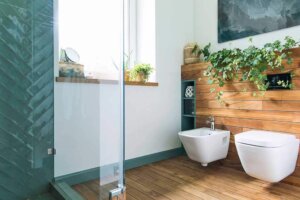
Knowing the best types of wood that you can use in your bathroom decor is very useful. This is because you’ll be able to determine which type is ideal for a wet area and you’ll understand how to take of it. Wood is a natural material that many people like, but we’re often scared of using it because it appears delicate.
However, the care, maintenance, and cleaning you give it will determine its useful lifespan. Remember, wood is sensitive to moisture, and as such, you’ll need to keep it dry. Although this doesn’t mean that you can’t use it in your bathroom. This is why we want to tell you about the options you have so that you can make the right choice.
What types of wood can you use in bathroom decor?
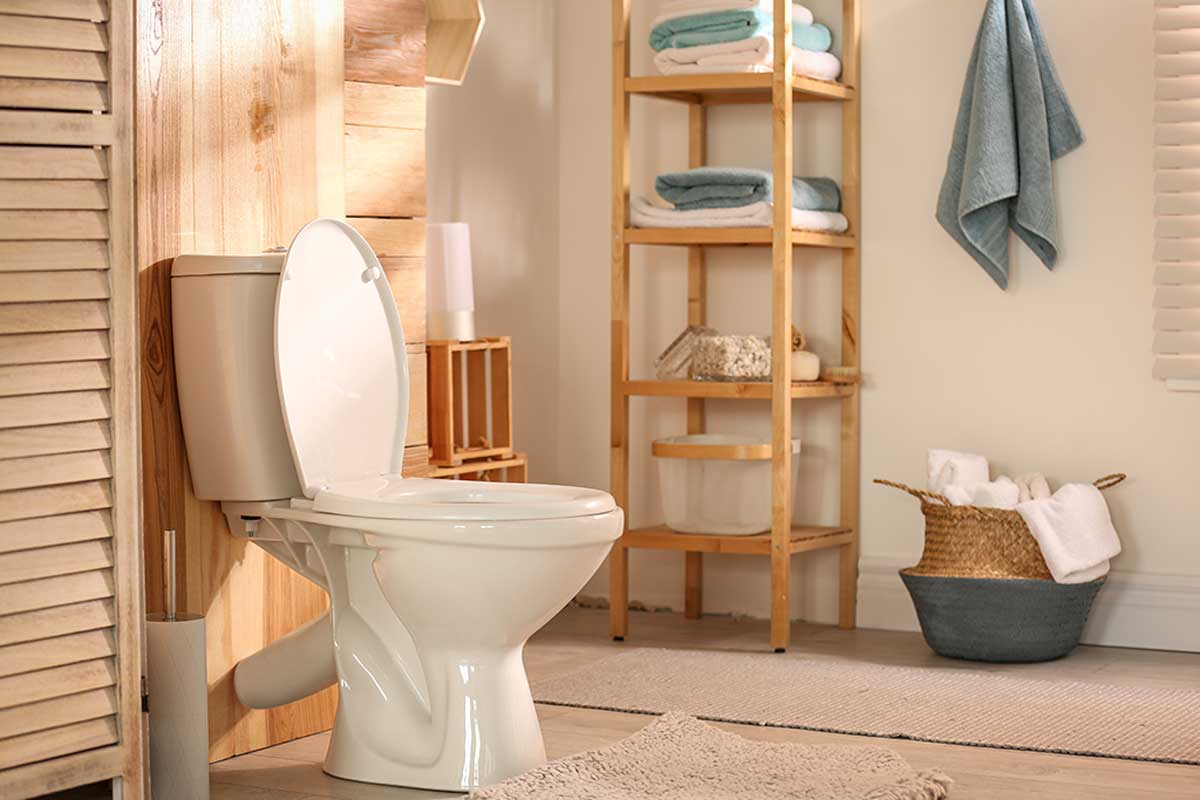
The two types of wood that are usually used in bathroom decor are teak and larch. The first comes from a tree that grows in a tropical area, so it has a high percentage of permeability. This feature makes it ideal for decorating your bathroom.
The second type is also resistant to water. For this reason, it’s often used on floors and on sink surrounds. Although it must be said that it’s also suitable for creating or building any structure that you want to install in humid areas.
Despite the outstanding resistance of this type of wood, you must still take care of it. Only by doing this will you lengthen its lifespan and enhance its beauty. Do you want to know more about how to care for teak and larch? Keep reading!
Using wood for bathroom decor: how to maintain it
The lifespan and beauty of wood will be longer and greater the less contact it has with water. However, when you use wood in bathroom decor it’s impossible to ensure that it never gets wet. The only thing you can do is follow the instructions for the special care that you must give this material. Below, we’ll tell you how to do this!
Oil-treated wood
Teak is often treated with oil to increase its impermeability. In this case, you must clean it with a special product specifically for this type of wood or with neutral soap. When you clean this material or after you’ve finished showering, make sure you leave it dry.
When you do clean your wood, try not to add too much liquid. This will prevent water from seeping into the wood and the joins and it’ll help to prevent damage. Equally, you should only use a minimal amount of cleaning product or soap.
Caring for varnished wood
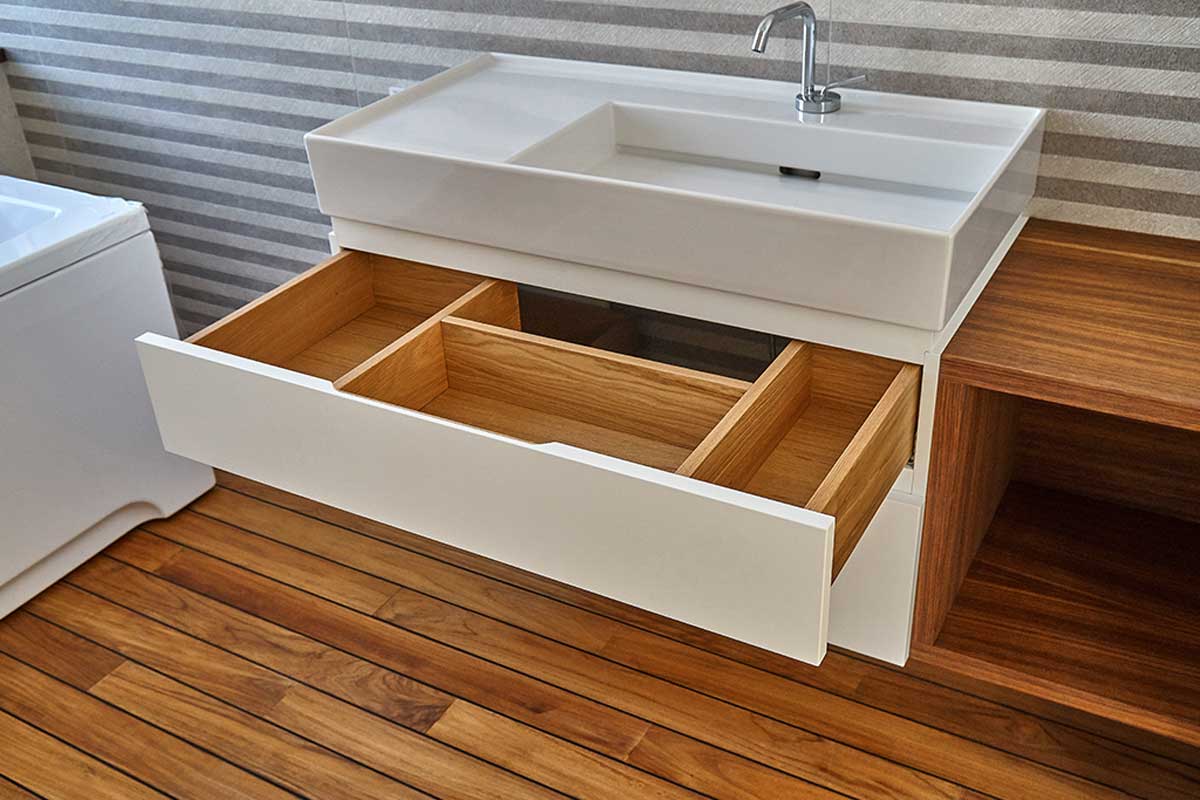
If the wood that you’ve chosen or the one that you’re already using has been treated with varnish, clean it with dry soap or with neutral soap. Dry soap works like any dry shampoo and the best way to apply it is with the help of a dry towel.
For dry soap cleaning, you need to follow these steps:
- Sweep or dust to remove the dirt.
- Apply the dry soap to a dry towel and pass it over the entire area.
- Take another clean, dry cloth and go over the area to remove the excess.
Following this process regularly will make your wood last longer and prevent the varnish from lifting. As for scratches, you can apply some of the advice we gave you regarding parquet.
Maintaining natural wood
Natural wood finishes are beautiful. This type of wood is generally much thicker than the types we’ve mentioned for using in the bathroom. It also requires less care.
Removing water stains, oil stains or other substances on natural wood is very simple. Just use a cloth, a little water, and cleaning products. It’s important that you clean it in the direction of the grain. As for any scratches, you can use soft sandpaper and apply light strokes to make them disappear.
Despite the care that wood needs, don’t be put off by having it in your bathroom. Be aware that wood is always more susceptible to developing problems such as mold or fungus. Equally problems with termites may be another issue. For this, there are special preventative products that you can buy.
Knowing the best types of wood that you can use in your bathroom decor is very useful. This is because you’ll be able to determine which type is ideal for a wet area and you’ll understand how to take of it. Wood is a natural material that many people like, but we’re often scared of using it because it appears delicate.
However, the care, maintenance, and cleaning you give it will determine its useful lifespan. Remember, wood is sensitive to moisture, and as such, you’ll need to keep it dry. Although this doesn’t mean that you can’t use it in your bathroom. This is why we want to tell you about the options you have so that you can make the right choice.
What types of wood can you use in bathroom decor?

The two types of wood that are usually used in bathroom decor are teak and larch. The first comes from a tree that grows in a tropical area, so it has a high percentage of permeability. This feature makes it ideal for decorating your bathroom.
The second type is also resistant to water. For this reason, it’s often used on floors and on sink surrounds. Although it must be said that it’s also suitable for creating or building any structure that you want to install in humid areas.
Despite the outstanding resistance of this type of wood, you must still take care of it. Only by doing this will you lengthen its lifespan and enhance its beauty. Do you want to know more about how to care for teak and larch? Keep reading!
Using wood for bathroom decor: how to maintain it
The lifespan and beauty of wood will be longer and greater the less contact it has with water. However, when you use wood in bathroom decor it’s impossible to ensure that it never gets wet. The only thing you can do is follow the instructions for the special care that you must give this material. Below, we’ll tell you how to do this!
Oil-treated wood
Teak is often treated with oil to increase its impermeability. In this case, you must clean it with a special product specifically for this type of wood or with neutral soap. When you clean this material or after you’ve finished showering, make sure you leave it dry.
When you do clean your wood, try not to add too much liquid. This will prevent water from seeping into the wood and the joins and it’ll help to prevent damage. Equally, you should only use a minimal amount of cleaning product or soap.
Caring for varnished wood

If the wood that you’ve chosen or the one that you’re already using has been treated with varnish, clean it with dry soap or with neutral soap. Dry soap works like any dry shampoo and the best way to apply it is with the help of a dry towel.
For dry soap cleaning, you need to follow these steps:
- Sweep or dust to remove the dirt.
- Apply the dry soap to a dry towel and pass it over the entire area.
- Take another clean, dry cloth and go over the area to remove the excess.
Following this process regularly will make your wood last longer and prevent the varnish from lifting. As for scratches, you can apply some of the advice we gave you regarding parquet.
Maintaining natural wood
Natural wood finishes are beautiful. This type of wood is generally much thicker than the types we’ve mentioned for using in the bathroom. It also requires less care.
Removing water stains, oil stains or other substances on natural wood is very simple. Just use a cloth, a little water, and cleaning products. It’s important that you clean it in the direction of the grain. As for any scratches, you can use soft sandpaper and apply light strokes to make them disappear.
Despite the care that wood needs, don’t be put off by having it in your bathroom. Be aware that wood is always more susceptible to developing problems such as mold or fungus. Equally problems with termites may be another issue. For this, there are special preventative products that you can buy.
